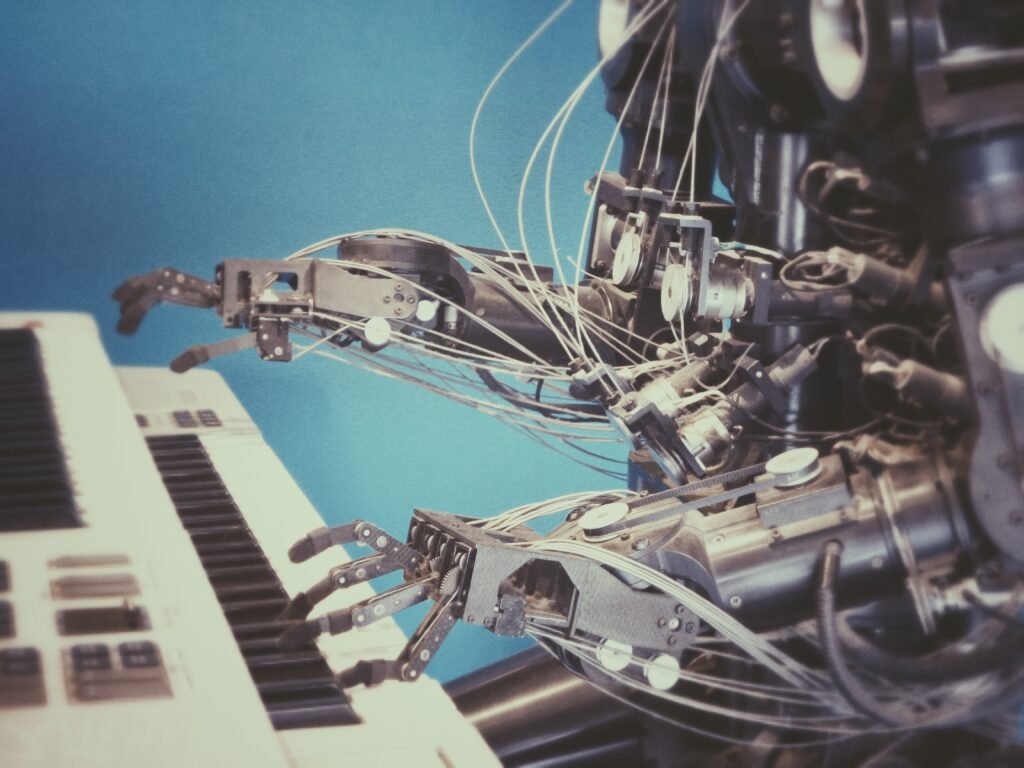Artificial Intelligence (AI) has taken the world by storm, revolutionizing diverse industries with its smart machines. With a focus on building machines capable of performing tasks that typically require human intelligence, AI is at the forefront of advancements in machine learning and deep learning. By allowing machines to model and improve upon human capabilities, AI holds the promise of transforming industries in unimaginable ways. From chatbots and self-driving cars to wearable devices and smart assistants, AI applications are everywhere. While the benefits of AI in fields like banking, medicine, and entertainment are undeniable, there are also challenges and limitations to consider. As public opinion on AI remains mixed, it is clear that we are navigating a pivotal moment in the evolution of technology.

AI: Revolutionizing Industries with Smart Machines
Artificial intelligence (AI) is a branch of computer science that focuses on building smart machines capable of performing tasks that require human intelligence. With advancements in machine learning and deep learning, AI is revolutionizing various industries and transforming the way we live and work.
Types of AI
AI can be categorized into two main types: strong AI (artificial general intelligence) and weak AI (narrow AI). Strong AI refers to machines that have the ability to solve problems they haven’t been specifically trained for. They possess a general intelligence similar to human intelligence. On the other hand, weak AI operates within a limited context and is designed to perform specific tasks without possessing a general intelligence.
Within these two broad categories, AI can be further classified into different types based on the complexity of tasks they can perform. Reactive machines are the simplest form of AI that have the ability to react to specific inputs but do not have memory or the ability to learn from past experiences. Limited memory AI, as the name suggests, can learn from past experiences and make decisions based on that information. Theory of mind AI is capable of understanding and interpreting the emotions, beliefs, and intentions of other beings. Lastly, self-aware AI is the most advanced form, as it possesses consciousness and is aware of its own existence.
Machine Learning and Deep Learning
Machine learning, a subset of AI, plays a crucial role in the development and advancement of intelligent machines. It utilizes statistical techniques to enable machines to learn from data, identify patterns, and make predictions or decisions without being explicitly programmed. This ability to learn and improve at tasks makes machine learning a powerful tool.
Deep learning, another subset of AI, takes machine learning to the next level. It utilizes neural networks, which are designed to mimic the human brain, to process data and make complex connections that result in better outcomes. Deep learning models are capable of handling unstructured data, such as images, audio, and text, and can achieve impressive levels of accuracy and performance.
Neural networks are a key component of deep learning. They are composed of interconnected nodes, called artificial neurons, that work together to process and analyze data. The power of neural networks lies in their ability to recognize patterns, adapt to changes in data, and make accurate predictions.
AI Applications
AI has found its way into various applications, transforming industries and improving efficiency and accuracy. Some notable AI applications include:
Chatbots
Chatbots are AI-powered virtual assistants that can interact with humans through chat interfaces. They are capable of understanding and responding to natural language, providing instant customer support, and even performing tasks such as placing orders or making reservations.
Google Maps
One of the most widely used AI applications, Google Maps utilizes AI algorithms to provide real-time traffic updates, suggest optimal routes, and calculate estimated arrival times. AI helps in analyzing vast amounts of data from multiple sources and making accurate predictions based on that data.
Smart Assistants
Smart assistants like Siri, Google Assistant, and Alexa are AI-based applications that can perform tasks and provide information based on voice commands. These assistants can answer questions, set reminders, play music, control smart home devices, and much more, making our lives more convenient and efficient.
Snapchat Filters
Snapchat filters use AI algorithms to identify and track faces in real time, allowing users to apply various fun and creative filters to their photos and videos. AI analyzes facial features and movements to add these filters in a seamless and engaging manner.
Self-Driving Cars
Self-driving cars are a prime example of AI revolutionizing the transportation industry. These vehicles use AI algorithms and sensors to analyze their surroundings, make decisions in real-time, and navigate safely without human intervention. Self-driving cars have the potential to improve road safety, reduce traffic congestion, and increase efficiency.
Wearable Devices
Wearable devices, such as fitness trackers and smartwatches, utilize AI to collect and analyze data related to health and wellness. AI algorithms can monitor heart rate, sleep patterns, activity levels, and provide personalized insights and recommendations for a healthier lifestyle.
Benefits of AI in Industries
AI offers numerous benefits in various industries, revolutionizing the way tasks are performed and improving overall efficiency. Some key benefits include:
Banking
In the banking industry, AI is being used to automate manual tasks, detect fraudulent activities, provide personalized customer experiences, and improve risk management. AI-powered chatbots can handle customer queries and requests, reducing the need for human intervention. Machine learning algorithms can analyze large volumes of financial data to detect patterns and anomalies, helping in fraud prevention. AI can also provide personalized recommendations and insights based on individual customer preferences.
Medicine
AI has the potential to greatly impact the healthcare industry. It can assist in diagnosing diseases, predicting patient outcomes, and identifying effective treatment plans. Machine learning algorithms can analyze medical records, images, and genetic data to identify patterns and predict disease progression. AI-powered robotic systems can assist surgeons during complex procedures, improving accuracy and reducing the risk of errors. AI also has the potential to streamline healthcare operations, optimize resource allocation, and improve patient care.
Entertainment
AI is transforming the entertainment industry by personalizing content recommendations, enhancing gaming experiences, and enabling creative applications. Streaming platforms use AI algorithms to analyze user behavior, preferences, and viewing patterns to suggest relevant content. In the gaming industry, AI can create interactive and immersive experiences by generating virtual worlds, adapting gameplay based on player behavior, and creating intelligent non-player characters. AI algorithms can also analyze large datasets to identify trends, predict audience preferences, and inform content creation decisions.
Challenges and Limitations
While AI holds immense potential, there are several challenges and limitations that need to be addressed. Some of the key challenges include:
-
Data quality and availability: AI algorithms heavily rely on large volumes of high-quality data. However, obtaining such data can be a challenge, especially in industries where data privacy and security are critical.
-
Bias and fairness: AI algorithms can inadvertently perpetuate bias and discrimination if not properly designed and trained. Avoiding bias and ensuring fairness in AI systems is crucial to prevent negative impacts on individuals or communities.
-
Ethical concerns: AI raises ethical questions around issues such as job displacement, privacy, and autonomous decision-making. It is important to establish ethical frameworks and guidelines to ensure responsible development and deployment of AI systems.
-
Technical limitations: Despite significant advancements, AI still faces technical limitations. For example, AI models may struggle to handle ambiguous or unexpected situations and may require large amounts of computational power to operate effectively.
-
Human-AI collaboration: Finding the right balance between human expertise and AI capabilities is a challenge. It is important to design AI systems that complement human skills and decision-making rather than replacing them entirely.

Public Opinion on AI
Public opinion on AI is mixed, reflecting both excitement and concerns. On one hand, AI offers numerous benefits and possibilities for improving various aspects of life and work. People are excited about the convenience, efficiency, and personalization that AI-powered technologies can bring. On the other hand, there are concerns about the potential impact of AI on jobs, privacy, and ethical considerations.
It is important to engage in ongoing dialogues and discussions about AI to address these concerns and ensure that AI development aligns with societal values and needs. The public’s opinion and involvement in shaping AI policies and regulations are crucial for creating a future where AI works for the betterment of humanity.
In conclusion, AI is revolutionizing industries with smart machines that can perform tasks requiring human intelligence. Advancements in machine learning and deep learning are driving the growth of AI, enabling machines to model and improve upon human capabilities. AI applications can be found in various sectors, offering benefits such as automation, efficiency, personalization, and improved decision-making. However, there are also challenges and limitations that need to be addressed, including data quality, bias, ethical concerns, and technical limitations. Public opinion on AI is complex, reflecting both excitement and concerns, and it is important to have ongoing discussions and engagement to ensure responsible development and deployment of AI systems.






